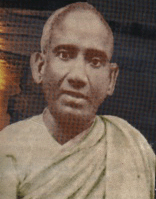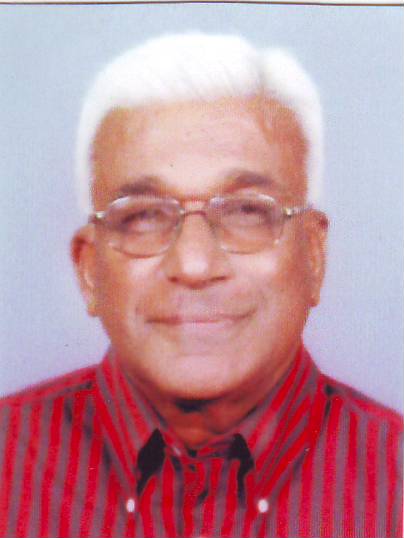|
Swami Vipulananda (1892-1947):
Pioneer literary critic in Lankan Thamil literature
K. S. Sivakumaran
  All
Lankans who contributed to the Independence of the then Ceylon now celebrate the
61st anniversary of the island nation. All
Lankans who contributed to the Independence of the then Ceylon now celebrate the
61st anniversary of the island nation.
Although it is a fact and one that is acknowledged that the majority of the
people in the blessed isle are the Sinhala Buddhist
community, yet there are significant people in the country belonging to
different communities. All of us belong to this Nation and the
Nation belongs to all of us.
Among the other communities are the Thamil-speaking people spread in most parts
of the country. They belong to Hinduism, Islam
and Christianity and their accent in speaking an ancient language like Thamil
varies according to where they are located.
If we speak of a Lankan Nation, we cannot therefore ignore or underestimate or
belittle almost a quarter of the population. Hence it is
necessary to understand the culture of the minority people at least through the
English language.
But those who know English in this country are miserably very low. The ideal
thing should be to communicate with the generally
generous Sinhala people through their language. This function the Thamil
politicians especially failed to do that. This is part of the
problem of the long drawn out ethnic tensions.
Just as much as the Sinhala people have the right to know what happens in the
Lankan Thamil and English Literary scenes, the
Thamil-speaking and English-speaking people have the right to know what’s
happening in the Sinhala cultural scene.
Culture and Literature
Culture is one aspect of life that could foster unity among people while
acknowledging or admitting diversities. And Literature forms
part of culture. Talking of Thamil Literature, we must clearly understand that
the Thamil Literature in Lanka is uniquely individualistic
(meaning special features that are different from the features in Thamilnadu in
India).
Sri Lankan Thamil Literature during the past 60 years had grown taking different
dimensions and directions. How and why could be
explained only in a book or thesis. In a newspaper article this is not possible.
However we can take one aspect of Lankan Thamil
Literature, namely Literary Criticism, and spotlight on one particular critic
for the purpose of this article.
The Critic
The critic concerned is a Swami belonging to the Ramakrishna Mission - the late
Swami Vipulananda. His real name before he
became a follower of the great Ramakrishna of India was Mylvaganam of Karaithivu
in the eastern province of Lanka. To avoid
digression, I shall avoid the bio-data of the great Thamil scholar and focus on
his contribution to Literary Criticism.
He was a great scholar in many ways and was the first Professor in Thamil in
Annamalai University in Thamilnadu and the first
professor in Thamil in the then University of Ceylon. A linguist, mathematician
and spiritual leader he wrote his magnum Opus- Yarl
Nool, a researched work on an ancient musical instrument called ‘Yarl’.
My discontent with a few was that they instead of seeing him as the pioneer
literary critic in Thamil in this country, they belittled him
as a mere ‘belles-letterist’, This attitude perhaps had been due to several
animosities that some of the Thamilians might have had with
overloaded superiority. As he was also a spiritualist some Marxist critics who
came to the fore in the 1960s to enrich the country’s
Thamil literature tactically ignored him.
But I had been insisting for a long time that Swami Vipulananda was the first
literary critic in local Thamil literature and even to some
extent in Thamilnadu. Why I say this is because if one analysed his writing one
finds that he practiced comparative studies of
Literature with a vast knowledge of Greek and Roman Literature as well as
English Literature. I had analyses his writing to prove the
point in one of my articles in Thamil. And this article is included in one of my
books in Thamil on Lankan Literature.
Characteristics
Let me outline the salient features in his critical approach through some of his
critical observations. These were found in his articles in
Thamil. I shall try to translate or tell briefly some of what these had been:
1. He was one of the firsts to classify Thamil Literature in general way back in
1939. he included the following under Early Thamil
works in Verse: the anthologies - “Paththu Paatu, Eddu Thohai, Pathnen Keel
Kanakku” and the five major epics - “Silapadikaram,
Manimekalai, Chinthamani, Choolamani” and “Nealakeasi” and other works that
include “Moovar Thamil” from Kongu Vearlmar
Kathai, “Thiruvasagam, Thiru Koavaiyaar, Naalayirathu Diviya Prabandam, Periya
Puranam, Ramavathaaram,” “Kantha Putanam, Villi
Bharatham, Thiruvilayadat Puranam, Bagavadam” by Ariya Pulavar and “Kaasi
Thaandavam” and Among those available he informed
the following shorter “Prabanthams” compiled by Kumarakurupar, Sivapragasam,
Meenadchi Sundaram and Subramania Bharathi.
As for semi-prose writing mainly commentaries that were available several
centuries ago were “Kalaviya Utai” by Nakerar, “Thiruvarul
Utai” by Patimel Alagiyaar, Chinthamani Utai” by Nachchinakiniyar, “Silapadikara
Utai” by Adiyaarku Nallar, “Prabantha Utai” by
Periya Vachchan Pillai, and two works “Periya Purana Vachanam” and
“Thiruvilayadat Purana Vachanam” by Aarumuga Navalar and
works “Meenadchi Sundarar Charitham, Udhayanan Kathai, Baudha Dharma Sangam* and
the abridged form of Chinthamani,
“Silapadikaram” and “Manimekalai” by Saaminatha Iyer.
2. The first steps in appreciating and evaluating literature as most critics
have described is to find out what is literary Taste and the
mental attitude in appreciating literary works and the literary tools available
to learn literature. In fact Swami Vipulananda had
underlined this more than half a century ago.
3. The literary critic in him has analysed the process of understanding
literature long ago before the modern critics in Thamil began to
ascribe in later years. He said that the mind, desire and engagement resulted in
clarity, pleasure and firmness and this in turn gave way
to Truth, Beauty and Goodness. Elaborating on this feature, his point of view
was that works on facts, physical sciences, logic and
philosophy are implicitly aesthetic.
But I am not sure whether I agree on that point. But he also added that books on
music and painting depict goodness. Books on
ethics contain beauty and truth goodness, he further said.
4. Swami Vipulananda gave primary importance to poetry or verse implying poetry
is full of feelings while the other forms of literature
depict individuality and talent in the Arts.
5. As we know one aspect of literary criticism is comparative study. Swami
Vipulananda had compared literary scenes in Villi
Bharatham with Homer’s epic poems. Perhaps taking a cue from the pioneer
literary critic in Thamil, the late scholar and critic, K.
Kailasapathy compared the Sangam Period BC 3rd -AD 3rd century) Thamil
literature with Greek Heroic Poetry in the last quarter of
the last century.
K. Kanapathipillai who succeeded Vipulanandar as Professor in Thamil and K.
Kailasapathy were admittedly influenced by the
pioneer critic in Lankan Thamil Literature.
sivakumaran.ks@gmail.com |

